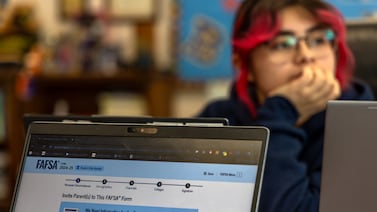Indiana is expanding its grant program for tutoring that it launched last fall to cover middle school students, as well as more elementary schoolers, the state education department announced Thursday.
In addition, the maximum grant award for Indiana Learns, which provides grants to students to use for tutoring and academic programs that meet “learning partner” requirements, is increasing to $1,000. The new maximum award of $1,000 is available to students who are new to the program and those who signed up earlier.
The state first rolled out Indiana Learns last fall in response to learning loss in the wake of the pandemic. Originally geared towards students in fourth and fifth grades, the program is now open to any student in third through eighth grade who qualifies for free or reduced-price lunch, and whose scores on state math or English language arts tests were below proficiency.
The expansion comes as 2023 state ILEARN scores demonstrated a small improvement in math but a slight dip in English. In 2022, 41.2% of Indiana students scored at or above proficiency in English, compared to 40.7% of students this year. Meanwhile, math proficiency rose from 39.4% in 2022 to 40.9% this year.
“We know from our 2023 ILEARN proficiency results, and the ongoing academic impact/recovery analysis, that our middle school students in particular need strategic learning support and interventions,” Secretary of Education Katie Jenner said in a press release.
Families can find out if their student is eligible for a grant by going to indianalearns.org and entering their student test number, or STN, and birthday. The STN can be obtained from their student’s school or their ILEARN scores if the family has access to that.
If a student is eligible, families can immediately view the funds available to them. On the same website, they can also browse tutoring partners and schedule services.
Prior to this expansion, in addition to the initial state grant of $500, districts could choose to provide an additional $250 per student for Indiana Learns that the state would match. But the state education department said that with the maximum Indiana Learns state award increasing to $1,000, there’s no longer a matching component of the program.
Molly Williams, a spokesperson for the Indiana Department of Education, said that when families use the grants and their remaining funding drops to $200, money will automatically reload if they still have grant funding available.
The state also said that the grants can now support tutoring during the day at schools.
Become a Chalkbeat sponsor
“This will allow parents and families, who may not otherwise be able to pay for high-dosage tutoring, to access these opportunities for their students and provide them the additional support they need,” Jenner said.
Jade Thomas is a summer reporting intern covering education in the Indianapolis area. Contact Jade at jthomas@chalkbeat.org.







